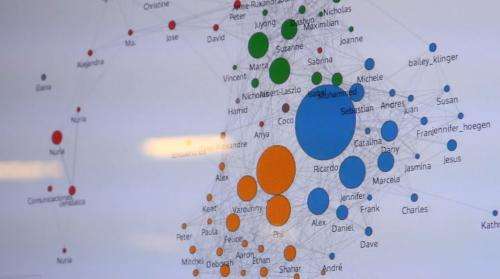July 3, 2013 weblog
Emails we weave: MIT's Immersion shows big picture

(Phys.org) —Suddenly metadata expands from a marketing buzzword heard years ago at think tank seminars about the next information age to mainstream political headlines in 2013. The NSA firestorm has popularized the term and planted it in most people's minds. MIT's César Hidalgo, professor of media arts and sciences at the MIT Media Lab, has an intense technology focus on that term and is prepared to enlighten people about their own metadata. If knowledge is power, then Hidalgo and his team have a project in mind that may empower people to leverage the chance to see their email information in a different way. The team's underlying question is fetching enough: What if people have control over their own metadata, able to view it, learn from it, and even delete it? For Hidalgo and his colleagues, Daniel Smilknov and Deepak Jagdish, their online project, dubbed Immersion, is about "self-reflection, art, privacy and strategy.".
People who sign up to participate in Immersion give the project their Gmail address and password; Immersion currently supports Gmail accounts. It scans every email in the person's account and scrapes the metadata to create a portrait of the person's personal network. Content of the email is not involved; only the fields of From, To, Cc and Time. Taking that information, a map evolves showing interconnections with lines and sized, color coded circles. The map shows how the user is related to the 100 most-contacted people in the mailbox.
Why would anyone want to get immersed in the first place? One argument is that Immersion permits you to get a larger perspective on your email life and at the same time have a safety net of knowing that you can always delete your data. "Just like a cubist painting," said the team, "Immersion presents users with a number of different perspectives of their email data." At a time when users milk the opportunity of social networking for self-promotion, a metadata view of one's email life might flip the coin toward self refection. Another value is that "it presents users wanting to be more strategic with their professional interactions, with a map to plan more effectively who they connect with," according to the team.
Being able to pull the off switch is especially emphasized: Upon logging out of Immersion, the project participant is presented with a choice to save or delete the data, which contains compressed email metadata and user profile.
More information: immersion.media.mit.edu/
via Boston
© 2013 Phys.org


















